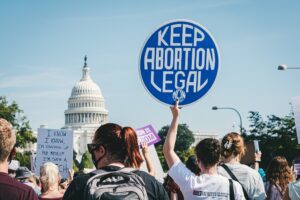The Fight for Abortion Access is Global: Commemorating International Safe Abortion Day
 Photo by Gayatri Malhotra on Unsplash
Photo by Gayatri Malhotra on Unsplash Since the 1990s, activists in Latin America and the Caribbean have mobilized on September 28th in favor of decriminalizing abortion, increasing access, and making the procedure affordable. The date is not random—on September 28, 1871 the Rio Branco Law was passed in Brazil freeing all children of enslaved adults, followed by the Saraiva-Cotegipe Law passed on September 28, 1885, freeing all enslaved people once they reach the age of sixty, acknowledging the direct line that connects reproductive fascism and slavery.
Following the popularity and power of the movement in Latin America and the Caribbean, in the early 2010s, the movement went international, making September 28th a global rallying cry for safe and equitable access to abortion. As it stands today, across the globe and in the United States, access to abortion is generally dismal.
The World Health Organization (WHO) approximates that between 5 to 13 percent of maternal deaths worldwide are due to complications from unsafe abortions. Given how strictly controlled, criminalized, and stigmatized abortion is in many parts of the world, we can almost expect that this number is far higher. Somewhat ironically, nations with liberal laws on abortion have seen declining rates of people seeking abortions while nations with strict restrictions or total bans on the procedures have seen an increase.
Abortion, when legal and accessible, is an overwhelmingly safe medical procedure – particularly when you compare it with pregnancy and childbirth.
While in the last fifty years we have seen a general global trend in favor of loosening restrictions on abortions with activists winning victories for legal abortion in places like Argentina and Thailand, the United States chose to go back in time five decades by eradicating the legal right to abortion on the federal level and green lighting numerous states to do the same. Since the far right Supreme Court overturned Roe v. Wade in their Dobbs v. Jackson Women’s Health decision last year, we have seen an alarming increase in maternal mortality rates and a chilling impact on the practice of obstetrics and gynecology in general in the United States.
According to a recent Kaiser Family Foundation survey of OBGYNs nationwide, 64% of those surveyed “believe that the Dobbs decision has also exacerbated pregnancy-related mortality”, 70% believe it has exacerbated “racial and ethnic inequities in maternal health,” and 55% reported Dobbs has “made it harder to attract new OBGYNs to the field.” The same survey further finds that “60% of OBGYNs in states where abortion is banned report their decision-making autonomy has worsened, and 55% say it is more difficult to practice within the standards of care, which are the norms of medical treatment.”
This sobering analysis should make clear to U.S. government officials that we are in the midst of both a public health emergency related to pregnancy care and abortion access and a legal crisis that puts providers and patients at great risk for simply accessing their basic right to autonomy.
While it would be a welcome step, it will take much more than the restoration of Roe v. Wade to solve the abortion access crisis we face in the United States. Access to abortion was virtually nonexistent in many states even when Roe was the law of the land. We need a full-scale government plan to address the many barriers to accessing abortions for patients, protect providers in delivering essential healthcare, decriminalize pregnancy outcomes, and provide funding directly to abortion funds and doula collectives. The United States should also repeal the discriminatory Helms Amendment, named after the late segregationist and former U.S. Senator Jesse Helms, which bars the U.S. from providing foreign aid for international family planning programs that mention abortion as an option, even in cases of rape and incest.
As long as there are no federal protections on abortion, red state governors, legislatures, compromised courts, and the white Christian nationalist ideology that fuels them, will continue to impose increasingly dystopian laws related to abortion access.
